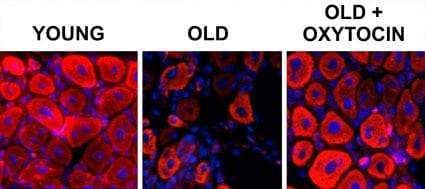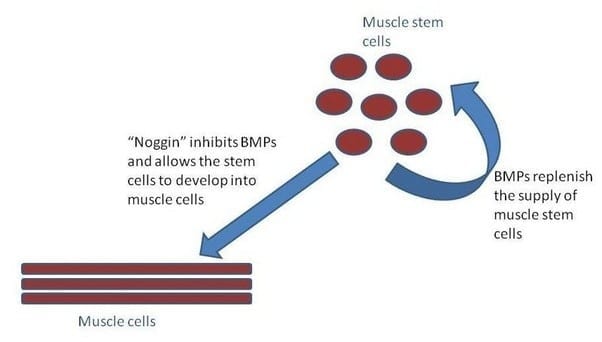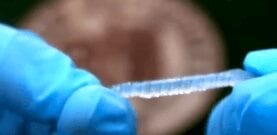
UC Berkeley researchers have discovered that oxytocin — a hormone associated with maternal nurturing, social attachments, childbirth and sex — is indispensable for healthy muscle maintenance and repair, and that in mice it declines with age.
A few other biochemical factors in blood have been connected to aging and disease in recent years, but oxytocin is the first anti-aging molecule identified that is approved by the Food and Drug Administration for clinical use in humans, the researchers said. Pitocin, a synthetic form of oxytocin, is already used to help with labor and to control bleeding after childbirth. Clinical trials of an oxytocin nasal spray are also underway to alleviate symptoms associated with mental disorders such as autism, schizophrenia and dementia.
“Unfortunately, most of the molecules discovered so far to boost tissue regeneration are also associated with cancer, limiting their potential as treatments for humans,” said study principal investigator Irina Conboy, associate professor of bioengineering. “Our quest is to find a molecule that not only rejuvenates old muscle and other tissue, but that can do so sustainably long-term without increasing the risk of cancer.”
Conboy and her research team say that oxytocin, secreted into the blood by the brain’s pituitary gland, is a good candidate because it is a broad range hormone that reaches every organ, and it is not known to be associated with tumors or to interfere with the immune system.
Read more . . .
The Latest on: Oxytocin
[google_news title=”” keyword=”Oxytocin” num_posts=”10″ blurb_length=”0″ show_thumb=”left”]
via Google News
The Latest on: Oxytocin
- 24 Intriguing Facts About Experiencing Love for the First Timeon May 7, 2024 at 10:37 am
Photo Credit: Depositphotos.com. 4. Oxytocin is the Reason You Fall in Love for the First Time Oxytocin is the main hormone responsible for the feeling of love. This natural hormone plays a ...
- Global Oxytocin Market Set to Soar, Projected to Reach US$ 164.9 Million by 2030on May 5, 2024 at 7:12 pm
The global oxytocin market is poised for significant expansion, with Future Market Insights forecasting a robust growth trajectory. By 2030, the global oxytocin market is anticipated to reach a ...
- Hack Your Brain to Boost Happiness by Monitoring These 4 Hormoneson May 4, 2024 at 7:00 am
You have more control over your happiness than it might seem. While you can't control everything that happens to you, you can intentionally work toward increasing the chemicals in the brain that are ...
- Banned Oxytocin still used in Delhi dairies, High Court takes noteon May 3, 2024 at 6:37 pm
While hearing a plea over “rampant use of Oxytocin hormone in the dairy colonies” in the national capital, the Delhi High Court has now called for action against its spurious use in dairy colonies and ...
- Delhi Court Orders Action Against Spurious Oxytocin Use In Dairy Colonieson May 3, 2024 at 5:36 pm
A division bench comprising Acting Chief Justice Manmohan and Justice Manmeet P.S. Arora ruled that administering Oxytocin without proper authorisation constitutes an offence under the relevant ...
- Delhi High Court orders police action against oxytocin use on cattle in city dairieson May 3, 2024 at 11:42 am
Delhi High Court orders action against spurious oxytocin use on cattle in dairy colonies, citing animal cruelty and offence.
- Delhi HC Orders Action Against Spurious Oxytocin Use In Dairy Colonieson May 3, 2024 at 6:28 am
The Delhi High Court has issued directives to combat the use of spurious Oxytocin hormone in the dairy colonies across the na ...
- Top 6 Best Oxytocin Supplement in 2024on April 25, 2024 at 5:00 pm
Oxytocin, often referred to as the ‘love hormone,’ is a natural hormone in humans that plays a significant role in social bonding, childbirth, and breastfeeding. Recently, oxytocin supplements ...
- Mapping the Neural Circuit of Social Avoidanceon April 25, 2024 at 7:51 am
Moving forward, Lin plans to continue studying this circuit to uncover other neuronal populations and brain regions that may contribute to social avoidance learning. She also wants to examine this ...
- Want to Be Happier? Pay Attention to These Hormoneson April 22, 2024 at 7:00 am
Almost everything that makes you feel "happy" is linked to one of the four happiness hormones: dopamine, serotonin, endorphin and oxytocin. Here are some ways you can boost them naturally.
via Bing News










